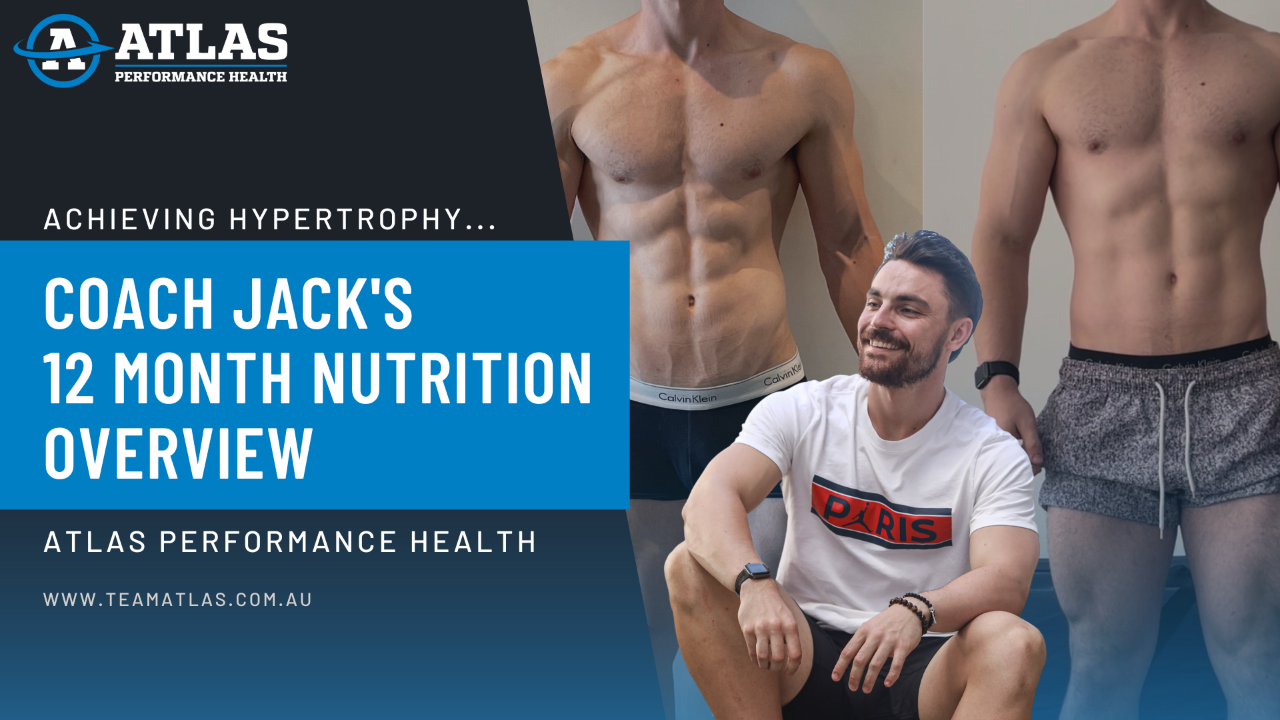
Achieving Hypertrophy: 12 Month Nutrition Overview
Jan 05, 2023Hey Team Atlas,
Happy New Year!
In the penultimate week of 2022, I brought you an in-depth article detailing my training across a 12 month period as I single-mindedly pursued the goal of hypertrophy last year and gained 11kg in the process.
Now, I bring you the other side of the equation - my nutrition over the course of those 12 months.
See, training is only part of the puzzle that is building muscle and while it's extremely important, I'd argue it's actually not quite as important as what you're doing the other 23 hours of your day.
Let's start with the food.
Yes, I ate in a caloric surplus the entire 11 months.

I'm not going to give you the exact numbers that I ate as let's be honest, you're not me and to you, those numbers will be arbitrary.
The important part here is that you find your maintenance calories, then add roughly 5 - 10% onto that number to find your conservative surplus calorie intake.
This is how my coach and I started the year.
We'd just come off a dieting phase and over the Christmas / New Year period had pushed me back up to a new projected maintenance where my weight had held really well so we based the starting calories off those numbers.
Regarding macronutrients, we went with a moderate protein (2.2g per kg of BW), moderate fat (0.9g per kg of BW) and high carb (the rest) approach.
The reason for the high carb intake is because when it comes to resistance training and a muscle building goal, carbohydrates are your friend. This is because resistance training is a very “glycolytic” activity due to the nature of your standard training prescriptions.
By this I mean, our training is typically powered by glycogen (carbohydrates) as our preferred fuel source. So a hefty intake of dietary carbohydrates not only helps us consume superior calories, but it also matches the nature of resistance training itself.
This is why you want a lot of them readily available to help push through what'll likely be more intense sessions with potentially higher training volume!
Yes, you want a good amount of protein too but given you have an abundance of calories coming in, recovery is going to be a much smoother process anyway and you'll be at far less risk of muscle catabolism when you're not eating in a deficit. So ludicrous amounts of protein such as 3g per kg of BW are just unwarranted when looking to build muscle.
From there, we pay attention to the data as we go and little tweaks are made to continue increasing intake.
See, just like in a dieting phase where you will see plateaus and inevitably have to adjust calories down, activity up or both, you'll have to do the inverse with building.
My calories were increased roughly every 6 - 8 weeks or so with conservative jumps of about 100 - 125 calories each time. Not everyone is going to need this but I'm a notoriously painful gainer due to having what's known as an 'inefficient metabolism.'
Put simply, the more I eat, the more I unintentionally move.
Whether it's fidgeting, or naturally just finding my step count has unconsciously started increasing... That's me. So when I'm in build phases I'm always finding that to continue steadily putting weight on I need to be staying on top of calorie increases and be a bit more aggressive with increases.
So how about managing to get the calories in? What did I change here?
Tip #1 - Start Eating Earlier
When I diet, I tend to like smaller breakfasts and then eat more of my calories later on in the day.
When I build however, this approach doesn't work and I tend to end up needing to eat too much food by the end of the day, resulting in massive meals, poor digestion and poor sleep as a result. So, what I did was developed a routine that meant I got up 15 minutes earlier than I needed to before Personal Training sessions in the morning (usually around 5:45/6am instead of 6:15/6:30am) and made an extremely quick and easy to make/eat breakfast.
I'd have two english muffins with jam for some carbohydrates and then either some high-protein greek yoghurt or, if I had more time, eggs with salsa on the side.

This meant that come 10am when I was generally done with clients and off to have my first coffee of the day, I was ready to eat again and could treat that as my pre-workout meal.
So, by the time I trained I was generally about 1100 - 1300 calories deep depending on what I had eaten as the pre-workout meal.
Tip #2 - Choose Consistent Meal Choices
The priorities for me throughout my entire build phase with meals were that they had to be easy to make, easy to digest and of course, relatively high in protein and carbohydrates so I could spread both macronutrients across the day.
The thing is, when calories are high, it's very easy to eat foods you enjoy or to make foods you don't enjoy taste better.
So basing your selections more around things like digestion and convenience can be a really helpful way to build your meals and not leave you feeling like you're ready to tap out halfway through the day.
On that topic, I also tried to keep my meal timings as routine as possible too. This helped regulate my hunger cues and helped me to actually continue to feel hungry as the build phase went on.
A lot of clients I've coached through builds have had issues with actually feeling hungry the deeper they get into their respective builds but a common issue that crops up is they're eating a massive breakfast, a massive dinner and nothing really in between.
The massive breakfast leaves them feeling over-full for hours after, while the coffee they then drink in the morning down regulates their appetite further.
By the time they're hungry again, it's usually late afternoon/evening and another over the top meal is consumed to try and finish off their calorie intake in one effort... this leads to a never ending cycle of feeling over-full, struggling to digest meals properly and of course, issues with energy levels throughout the day and sleep at night.
You’d likely want to try and split your calorie intake into 4-5 main feedings across the day, even more for any of the bigger fellas reading this whose intake may even rise as high as 4000+.
For me, I generally went with four meals to start my build and later it ended up at five which is a lot of time spent eating. However, as touched on previously, I also spent a lot of time moving because hey, bundle of nervous energy!
Tip #3 - Small Additions Go a Long Way
Essentially, I just did the inverse of what you'd want to do when you diet.
You know the drill for a fat loss phase... Coffee without milk, cooking sprays instead of oils, low sugar Powerade instead of full sugar, lots of 'macro friendly' variations for snacks and meal ideas.
For my build phase, especially toward the final months where calories really got high, I just embraced a lot more of these things.
I started cooking my steak for dinner with oil instead of spray (+130kcal), my coffee order became an oat milk latte instead of a long black (+140kcal), I started eating more pasta over rice and including cereal and honey in my greek yoghurt.
These additions may not sound like much, but adding 300 calories extra to your day without any impact on satiation? Makes a huge difference (in both fat loss and build phases).
On top of some of these adjustments to nutrition, there were a few other things I really tried to focus on when I was in my build phase - and in truth, do anyway regardless of goal.
The first is a consistent sleep pattern.
We have a plethora of research available now revolving around the importance of consistent sleep and wake times for optimising not just muscle building but health in general at this point and I tried to strive hard for 7 - 8 hours of quality sleep per night, with sleep and wake times roughly staying within half an hour of each other.
This helped me develop a routine for my schedule a lot better, helped my energy levels remain fairly stable and meant that if things started to feel off, I could easily check in with myself as to whether my sleep had been a factor.
The second is step count.
As mentioned, I'm a very active person but I really did my best to minimise extra movement in order to allow myself the best opportunity to grow.
I'm not saying don't move when trying to build muscle as heart health is so important, as is mental health which walking can really be helpful for, I'm just saying that averaging 16k steps a day every day may not be the best way to go about trying to grow muscle mass.
For me, I managed to whittle mine down to about 12,000 a day which is still a lot but for someone who walks almost everywhere due to living in such close proximity to everything in need... This actually took some effort!
The third, and possibly most important one out of everything, was I learned to exercise extreme patience with this goal.
You can go through a short, 4 week build phase if you want... but you'll gain f*ck all muscle mass - especially if you're a natural lifter.
Your body needs time to grow. A lot of it and a lot more than you likely think it does.
I continually checked in with myself about how I was feeling around my body composition at the time, allowed myself to sit with the feelings of discomfort surrounding how some of my clothes were fitting and simply reminded myself of the long-term goal.
Gaining muscle mass does come with a price but it's a very small one to pay in the pursuit of long term body composition changes and if you truly want to change your body shape - not just the weight on the scales - then have patience and push through those feelings of discomfort. They're only temporary while the positive changes you could make to your overall strength, body shape and confidence will last you a long, long time.
I hope these two blog posts have helped. It wasn't the easiest unjumbling 12 months of thoughts onto a page! But I do hope I've been able to bring some value to those of you who have been considering building in the New Year and spending 2023 chasing new muscle mass.
If you're keen on pursuing this goal but still unsure of where to start or feel like it's a lot to figure out, why not sign for online coaching with Team Atlas? We've got your back and we'd love nothing more than to help!
Thanks for reading and until next time,
Jack

